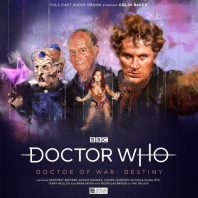
Released September 2022
SOME SPOILERS FOLLOW
The Doctor’s decision to avert the creation of the Daleks has caused the universe to diverge with all-encompassing war the result. In Doctor of War: Destiny, Colin Baker returns as the resultant Unbound Warrior incarnation.
Nigel Fairs opens Destiny with ‘Who Am I?’ and a return to the Tesh and Sevateem conflict introduced in 1977’s ‘The Face of Evil.’ Naturally, Leela becomes the focal point to anchor this iteration of her world in a sense of familiarity, and Louise Jameson spectacularly recaptures the energy and excitement of her beloved character as Leela comes to discover the truth behind her god Xoanon and the path this world is following. Leela is purposefully written and portrayed as being more naïve to again bring into focus just how much traveling with the Doctor changed her, and her beliefs about both the Tesh and Xoanon expertly create a very visual reminder of the tenuous foundation at the core of both of these populations that have so greatly diverged after so many years apart.
Through the Tesh society and the specific and limited pair bondings that Xoanon allows, there’s quite an intriguing exploration of Xoanon’s will, the structure of this hierarchical society as a whole, the feelings of individuals seemingly devoid of choice, and the role of family throughout it all. Unfortunately, while the inherent drama presented is visceral and relatable, the anchoring performance of Philip Hurd-Wood as Jabel is far too stiff and completely lacking in any emotion which undermines the nuanced work of Jason Forbes, Deeivya Meir, and Geoffrey Beevers elsewhere. Whether this was a purposeful decision to evoke an air of superiority or else to imply a detachedness due to Jabel’s position, the end result is tonally out of place and minimizes the impact of what in any other circumstance would be incredibly emotional and resonant situations and conflicts.
Strangely, for a story in this Doctor of War series, Colin Baker is all but absent except for brief snippets as a voice of Xoanon and a crucial moment alongside the Master who has been guiding events on this world for so long. This isn’t the first story in this series that has seemingly been waiting for the Doctor to arrive to fully reach its potential, and while Geoffrey Beevers excels in his leading role as the Master who is so calm but utterly callous at the same time, having these events occur outside of a range dedicated to the Master means that there is a unique opportunity to truly highlight a new and more dangerous side to the Doctor that has been all but completely missed. The Master’s steady guiding not only of individual people but also of the populations as a whole to create and then propagate through time manipulation a force to defeat the Daleks is an audacious one, and his plan to then turn against the Time Lords and even the Doctor himself is suitably grandiose, and the backdrop of the Tesh and Sevateem separation is excitingly redefined as a result even if the distinct lifestyles up to that point are treated exactly the same as in the original story. However, not directly featuring the Doctor more often here is a misstep for this mini-series regardless of any ultimate payoff in the long term.
There are undoubtedly plenty of truly strong ideas and discussions within ‘Who Am I?’; however, a crucial supporting role lacking in emotion and energy and the absent main character who still requires more characterization after only three stories so far dampen meaningful portions of the story and raise certain questions unrelated to the plot, respectively. Fans of the Master and of Leela will assuredly be pleased given the immense characterization and the brilliant performances that Beevers and Jameson offer, but those looking for something to truly showcase the Unbound nature of the Doctor of War will again be disappointed.
- Release Date: 9/2022
- Directed by: Barnaby Kay
- Written by: Nigel Fairs


Leave a Reply